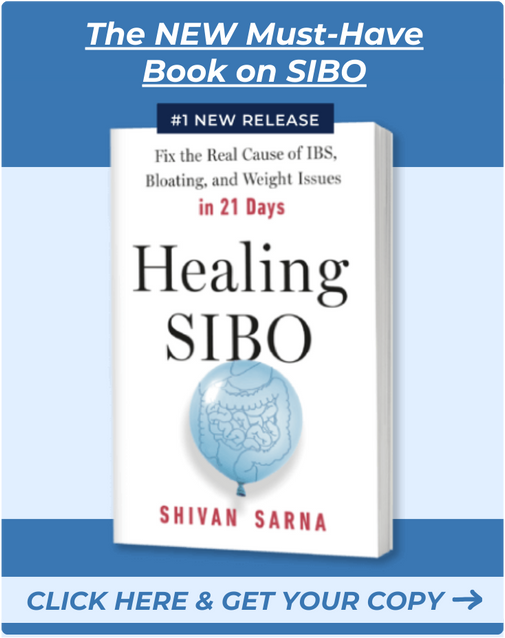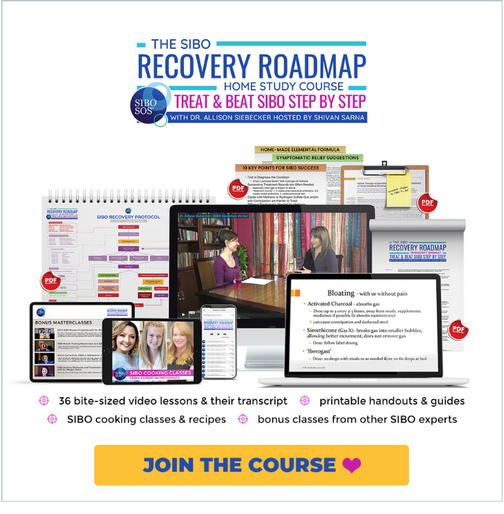After months of hard work and commitment to your treatments, you finally did it: you beat Small Intestinal Bacterial Overgrowth (SIBO). And it felt amazing- you were finally able to get back to your life and feel like you again.
However, something has changed, and all of the sudden you are finding yourself back in the grips of old symptoms.
Believe me, I understand. As a patient advocate, I’ve seen many SIBO patients come to SIBO SOS® Q&As or masterclasses with questions, frustrated that their SIBO seemed to suddenly come back. You aren’t alone!
However, the silver lining in your relapse is that it’s completely treatable and often a learning opportunity to continue learning how to manage your SIBO. Keep reading to learn about why you are relapsing and what you can do, and, above all, don’t panic.
(Confused? Learn more about what SIBO is and its symptoms here.)
Your Diet
One of the most common reasons for a SIBO relapse is a change in diet. If you were careful during your treatment about what you ate but have recently returned to old habits once your overgrowth cleared up, your body probably still requires a more specialized, consistent diet.
Foods like sugar, alcohol, potatoes, fruit, white bread, and other carbohydrates get converted into sugar in your gut, feeding the “bad” bacteria that cause SIBO and allowing your symptoms to come back.
A few quick fixes our SIBO patients love:
- We recommend replacing sugar with Stevia, honey, coconut sugar, or other natural sweeteners and seeing what limits your symptoms the most.
- Fruit can be a sneaky culprit of SIBO symptoms. Try replacing high-sugar fruits, like grapes, mangos, cherries, and pears, with low-sugar fruits like berries, cantaloupe, papayas, and guava.
- Avoid alcohol as much as you can as it’s sugary and fermented- but if you must drink, try sticking to a small amount of tequila or a glass of red wine.
- To reset your gut and figure out what really makes your body react, try starting a low-FODMAP diet and slowly reintroducing foods to discover what you can tolerate.
In our SIBO Recovery Roadmap® course, Dr. Allison Siebecker explains different already-established and proven SIBO diets that many patients keep consistently. There are many different options that can fit every patient’s dietary preferences, digestive needs, and even favorite snacks.
Travel
If you’re exploring a new place or have traveled recently, it’s possible that you’ve eaten food with pathogenic bacteria your body isn’t familiar with- or even picked up a parasite that’s wreaking havoc on your gut and mimicking SIBO symptoms. Try seeing a naturopathic doctor or gut health specialist to get tested for parasites and make sure everything is clear in your gut.
If you think you could’ve come in contact with a parasite, read about the 10 ways you could’ve been infected.
Stress
During periods of stress, the body’s “fight or flight” response is activated, diverting resources away from non-essential functions like digestion. This can lead to reduced stomach acid production and reduce motility. If you aren’t already, try taking a prokinetic to aid your Migrating Motor Complex, and prioritize your mental health as you retreat your SIBO.
Confused by prokinetics? Consider watching Dr. Allison Siebecker’s SIBO essentials video lessons, where you’ll learn the basics about SIBO, SIBO diets, prokinetics, and more.
Underlying Conditions
An underlying gut condition like diabetes, Crohn’s disease, celiac, leaky gut, Candida overgrowth, mold disease, and more can greatly impact your SIBO treatment and cause relapses or mimic symptoms. Part of treating SIBO includes diagnosing and addressing these conditions. If you’ve treated your SIBO but still feel like something isn’t right, listen to your gut (literally)!
If you’re looking for information on conditions that often occur in conjunction with SIBO and prevent you from fully healing, check out our SIBO & Beyond Masterclass Summit, where you’ll learn about mold, Candida, parasites, MCAS, long-haul COVID, and more from gut health experts.
How to Treat a SIBO Relapse
Ah frustrating as they may be, treating a SIBO relapse doesn’t have to be stressful. We’ve created the SIBO Recovery Roadmap® to create an action plan for patients in all stages of SIBO. If you’re having a relapse, you can follow the roadmap to figure out what’s behind it and what you can do to retreat your SIBO.
If you’re interested in following the roadmap with practitioner advice and live Q&A sessions, consider joining the SIBO Recovery Roadmap® course. Learn more here.






